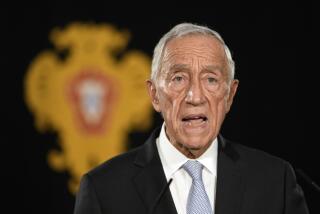Italian Premier Quits; He Held Post for 7 Months
ROME — Italy’s besieged and embittered Prime Minister Silvio Berlusconi on Thursday bowed out of a riches-to-political-rags government that was born with bold promises but died in internal dissension after seven frustrating months.
On a gray afternoon, Berlusconi rode through Christmas traffic up Rome’s Quirinale hill in his bullet-proof Mercedes-Benz to tender his resignation to President Oscar Luigi Scalfaro.
“I feel lighter. I have gotten rid of a great weight,” Berlusconi told reporters when he emerged from the 45-minute meeting in the Renaissance Quirinale Palace that has been home to popes and presidents.
Berlusconi, a 58-year-old media tycoon, entered politics in January, promising a new deal for Italy after decades of political cronyism underwritten by endemic corruption. But the prime minister himself became a target of prosecutors, who alleged that, before he entered politics, bribes were paid to tax inspectors at his Fininvest media and retail company. Berlusconi denies that he knew about them.
Then, last week, Berlusconi’s coalition partner, Umberto Bossi, leader of the populist Northern League, broke with him and joined the opposition in three no-confidence motions. Berlusconi quit to preempt an embarrassing defeat in a parliamentary vote.
The collapse of the nation’s 53rd postwar government foreshadows a period of political uncertainty.
Both the lira and the stock market have fallen in recent weeks as Berlusconi’s right-wing coalition teetered and finally toppled like a dried-out Christmas tree.
Scalfaro, a former member of the long-ruling but now discredited Christian Democrat party, asked Berlusconi to stay on as caretaker until a decision is made to form a new government or call elections.
Today Scalfaro begins a round of consultations with political leaders that will end--probably after Christmas--in one of three ways: He will ask Berlusconi to form a new government, give the task to someone else or call new elections.
Scalfaro is believed to think a new government could be formed within the existing Parliament, which was elected nine months ago.
Berlusconi and his neo-fascist allies, the National Alliance, favor new elections.
“I asked President Scalfaro to call elections as soon as possible, and I also suggested a date,” Berlusconi told reporters Thursday.
Starting Wednesday afternoon, Italians had followed live television transmission of the proceedings as government deputies in Parliament heatedly traded charges with their erstwhile allies and the opposition. The debate broke off abruptly Thursday morning after an impromptu Cabinet meeting, when Berlusconi announced that he intended to throw in the towel.
Berlusconi’s coalition--three right-wing parties, headed by his Forza Italia (Go Italy)--had been under constant pressure since it was installed in May to resolve a huge public debt problem, to complete continuing political corruption probes and to meet demands that Berlusconi divest his business holdings. Bossi was an outspoken critic of Berlusconi on these issues.
Early this month, a 2 1/2-year-old corruption inquiry by magistrates in Milan closed in on Fininvest. Pressing their investigation of payoffs to politicians by business people and industrialists in return for government contracts, they interrogated Berlusconi.
The prime minister loudly protested his innocence, and his lawyers have demanded that the case be shelved. But as Berlusconi resigned Thursday, news came that his brother Paolo, who heads the Fininvest publishing enterprises, was given a seven-month suspended sentence for paying $90,000 in bribes to the corruption-tainted Christian Democrat party.
Italy’s latest government was hailed last spring as one that would give national politics a fresh start with new faces and new parties, but it crumbled in much the same way as its predecessors had. Berlusconi entered politics in a successful effort to short-circuit a victory by the left, led by the former Communist Party.
He won the March elections with promises of a freer market, lower taxes, open government and a corruption-free political system. But his government was forced to its knees partly by the same political squabbling, unpopular budgets and suspicions of corruption that were the hallmark of previous governments.
*
During the parliamentary debate, which Berlusconi himself called, the beleaguered premier attacked Bossi, accusing him of treachery against the government and voters.
“After being elected with the votes of the Forza Italia voters he has . . . betrayed them,” he cried angrily in a 25-minute speech. He termed Bossi’s no-confidence motion “a slap in the face” and “a resounding offense to good sense and to the citizens’ trust.”
Bossi, for his part, accused the government of fulfilling none of its promises, which ranged from the creation of a million new jobs, to the privatization of industry, to antitrust and conflict-of-interest laws that would have stripped Berlusconi of direct control over his television and publishing interests.
Upon Berlusconi’s resignation, the Northern League split after about two dozen of their 100 or so members of Parliament, led by Interior Minister Roberto Maroni, decided to support Berlusconi.
Times staff writer William D. Montalbano contributed to this report.
More to Read
Sign up for Essential California
The most important California stories and recommendations in your inbox every morning.
You may occasionally receive promotional content from the Los Angeles Times.









